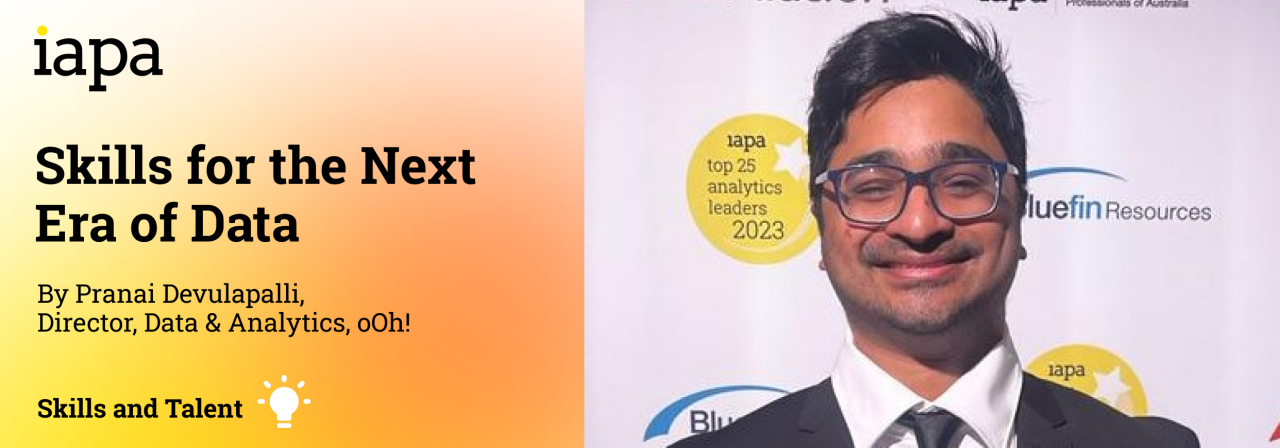
Skills for the Next Era of Data
By Pranai Devulapalli, Director, Data & Analytics at oOh!
We’re living through one of the most exciting and overwhelming periods in the data world. Tools evolve faster than job descriptions can keep up. One year it’s advanced modelling, the next it’s cloud-native workflows, and now it’s Gen AI.
But as the buzz grows louder, I keep coming back to a simple question:
What makes someone effective in this space today and tomorrow?
After more than a decade working across data science, insights, and product-led roles, one thing is clear: it’s not just about technical skill. The people who consistently thrive bring a mix of curiosity, adaptability, communication, and a mindset geared toward solving problems and scaling solutions. These capabilities, not just technical certifications, are what we need to prioritise if we want to build resilient, future-ready teams.
1. Curiosity Over Code
Yes, knowing Python or SQL matters but what matters more is why you’re using it.
Curiosity drives the best work I’ve seen. It’s what pushes you to ask, “what’s really going on here?” instead of stopping at a surface-level dashboard. or pulling a report for the sake of it. It fuels better hypothesis formation, more insightful analysis, and often leads to solutions that surprise stakeholders and create value beyond the initial ask.
Personally, this mindset has been a game-changer. It’s what moved me from writing ad-hoc reports to designing more scalable, product-led data solutions that have meaningful impact across teams.
2. The Real Edge: Adaptability
I started my journey with SAS, then shifted to R, then Python, and now work extensively with cloud-native platforms and Gen AI tools. The one thing that’s stayed the same? Change.
Technical stacks evolve constantly. Entire toolchains can become obsolete in just a few years. That’s why the real skill isn’t knowing a specific language or library - it’s being able to learn, unlearn, and relearn.
When hiring, I now look less for deep expertise in one tool and more for people who can navigate uncertainty and pick things up quickly. A growth mindset is far more valuable than a static skillset.
3. Make It Make Sense
No matter how technically brilliant your work is, it doesn’t create impact unless someone understands it and can act on it.
Whether you’re presenting insights, building dashboards, or writing technical documentation, clear communication is non-negotiable. Some of the most valuable professionals I’ve worked with are not just analysts, they’re translators. They know how to take complex ideas and make them resonate with stakeholders.
As Gen AI becomes more embedded in our tools, the ability to tell compelling, human-centred stories with data will become even more important. Automation can summarise the ‘what’ but the ‘why’ and ‘so what’ still need a human touch.
4. From Outputs to Capabilities
We’re no longer just solving isolated problems. We’re building capabilities that can be reused, scaled, and integrated into everyday decision-making.
That requires a product mindset. It means thinking beyond the immediate task and asking:
- Can this solution work across teams or timeframes?
- Could someone else pick it up and use it without needing me to explain it every time?
- Are we embedding this into a workflow, or just delivering a one-time output?
This shift, thinking in terms of systems rather than single-use solutions is what turns data teams into strategic enablers, not just support functions.
5. Exploring What’s Next: Gen AI & Agentic Systems
Like many others, I’ve been exploring how Gen AI can help accelerate and simplify everyday workflows - whether it’s automating documentation, assisting with exploratory analysis, or enabling stakeholders to engage with data more intuitively.
I’m also beginning to explore the emerging world of Agentic AI - systems designed to reason, plan, and execute tasks more autonomously. While we’re early in this journey, it’s raising exciting questions around how we build systems that are not only intelligent but also aligned with human goals and ways of working.
The success of these explorations won’t come down to prompt engineering alone. It will require us to understand workflows, design for real user needs, and think ethically and inclusively from the start.
Final Thoughts
If you’re building your own career or building a team, don’t just focus on the latest tool or hottest title. Ask:
- Are we hiring people who are curious and willing to learn?
- Can they adapt to change?
- Can they communicate with impact?
- Can they build systems, not just solve one-off problems?
These are the traits that will define the next era of data.
And in a time when tools will keep evolving, it’s the mindset that will always stay in demand.
About the Author
Pranai Devulapalli is the Director, Data & Analytics, oOh! Pranai was also in the 2023 cohort of Top 25 Leaders in Analytics.
